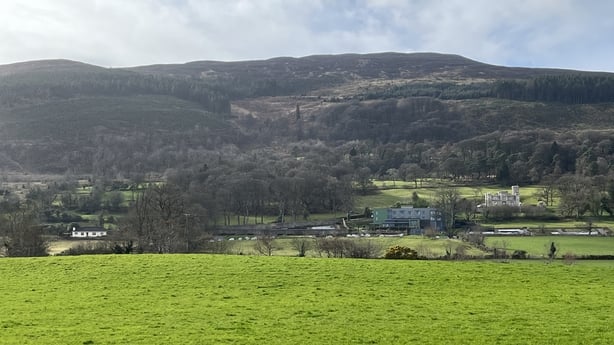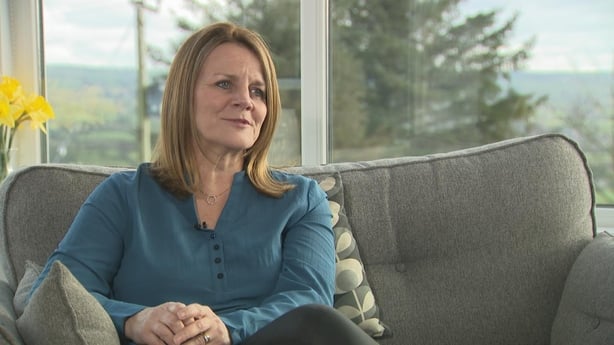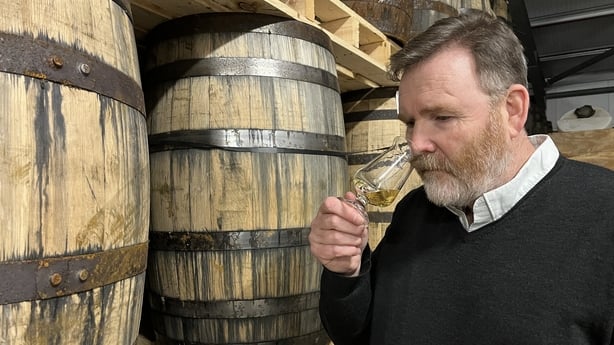The international spotlight on Northern Ireland 25 years ago sent a message around the world.
After decades of turmoil, it was a place again where people could do business.
Wealthy Australian businessman Mick Boyle had strong links to south Armagh – one of the cradles of the conflict.
His parents hailed from there. They had emigrated to Sydney in Australia in the 60s when he was a young child.
As a young man, he had been sent home to visit family and found south Armagh of the 1980s a strange experience.
"It was a very strange place for me to land in from the life we'd been living in Sydney," Mr Boyle said.
"There were soldiers everywhere, in the fields, there were checkpoints. But the people were very nice to me. It was a strange place, not an easy place to bring up a family, I'm sure, but I had lots of friends here."

He went on to build Abergeldie, a successful engineering company in Australia, delivering complex infrastructure projects such as roads, bridges and dams.
When the opportunity arose to buy a 19th Century castle on the slopes of Slieve Gullion in the heart of south Armagh, he took it.
By then the British Army had taken down their watchtowers and left the area. But Mr Boyle’s plan to convert the castle and build a luxury hotel still was not straightforward.
Not everyone could see the possibilities of peace.
"Everyone thought I was crazy. We had to bank this out of Australia because we couldn’t borrow the money to build a four-star hotel in south Armagh. The banks thought the people wouldn’t come. But people do come," he said.
A chance to live back home

Gillian McAuley is the current President of the Northern Ireland Chamber of Commerce and Industry.
As a young girl, her parents moved to Canada, partly to escape the burgeoning Troubles, partly for a better life. But she missed family and hankered after home, often crossing the Atlantic unaccompanied as a child for holidays.
A qualified lawyer, she remembers the day Canada heard that the place she still considered home had turned a corner after 30 years of violence.
"I remember quite distinctly when the Good Friday Agreement was happening and going home for Easter and going to church with my parents on Sunday morning and the minister praying for peace in Northern Ireland," Ms McAuley said.
"I thought 'oh, maybe something different is happening here, maybe there's a chance I could actually live there again’."
The spotlight on Northern Ireland 25 years ago sent a message around the world - it was a place where people could do business again. Mick Boyle decided to convert a rundown castle into a hotel - a dream which 'would never have happened' without the Good Friday Agreement #GFA pic.twitter.com/BTviKDdsuo
— RTÉ News (@rtenews) April 5, 2023
Three years later, she took a one-year leave of absence from her job in Canada and returned to Northern Ireland. She never went back.
Representing businesses across Northern Ireland, she now promotes it to an international audience, selling the virtues of its unique position with a foot in both the EU and UK markets and an educated workforce.
"From a business perspective certainly what we’re seeing now is a greater interest in Northern Ireland," Ms McAuley said.
"There are many more businesses that are willing to invest here and we’re getting better press out there.
"It’s an easier place to do business, we’ve got great education, great skills and when people come and see what’s here, it’s a great place to live.
"We want to be a place that people will bring their money. The world is our oyster if we can just grab it."
A boost for border counties

It was not just the six counties of Northern Ireland that felt the benefits of peace. The border counties of the Republic, which had suffered economically too, also got a boost.
Confidence was the key, as far as James Doherty is concerned.
A citizen of the world with roots in Donegal, he had a dream of building a distillery in the county.
The Good Friday Agreement created the conditions where he could persuade international money markets, that they could safely invest in his €15m project.
We need your consent to load this rte-player contentWe use rte-player to manage extra content that can set cookies on your device and collect data about your activity. Please review their details and accept them to load the content.Manage Preferences
The Sliabh Liag Distillery in Ardara was born, producing, he laughs, the first legal bottle of whiskey in Co Donegal in over a century.
"We needed to raise some version of €15m to really make this work," Mr Doherty said.
"We really needed to find that money internationally and so with the peace process, the peace dividend is that you are able to raise money on an international platform with people who understand that the risks of what would have been there before are not there anymore.
"So, their confidence in what you can do and what you can achieve is enhanced significantly."
Cross-border trade is now a big part of the all-island economy. Goods and services worth €9.5bn move back and forth in both directions annually.
The number of overseas visitors to Northern Ireland has doubled over the years. Belfast is now a regular stopover for international cruise companies.
A vibrant film and television industry promotes the place through TV series like 'Game of Thrones’. International golf tournaments have helped the big sell.
Statistics appear to show the people are wealthier, healthier and happier.
The architects of the Good Friday Agreement can claim the credit for much of that.







